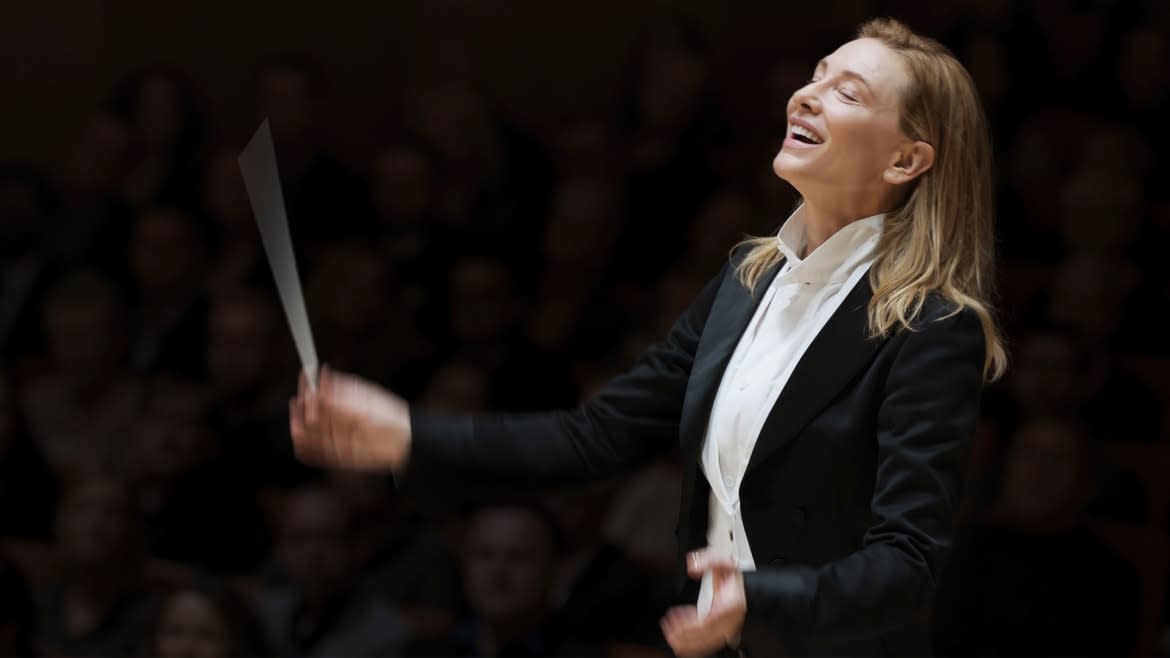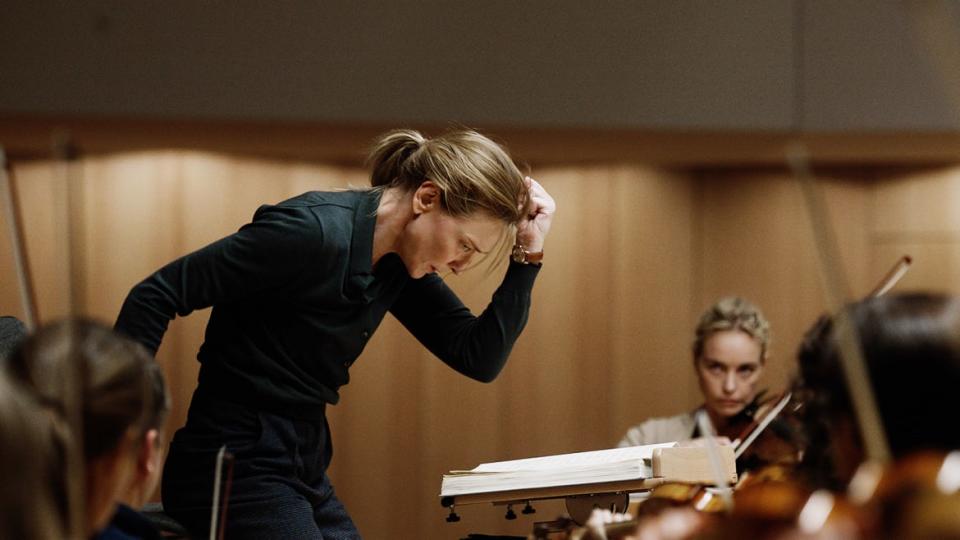In ‘Tár,’ Cate Blanchett Is at the Peak of Her Powers as a Formidable Maestro

Early in Tár, world-renowned conductor and composer Lydia Tár (Cate Blanchett) sits down for an on-stage interview whose topics range from her mentor Leonard Bernstein to her upcoming plans to tackle Mahler’s Symphony No. 5 with the famed Berlin Philharmonic. The real subject of this chat, however, is Tár herself, and in particular, her imposing artistic intellect, which exudes from every eloquent turn of phrase and dense, thoughtful response. In that regard, it’s also, at heart, a showcase for Blanchett. Authentically capturing that particular brand of for-an-audience fluency, introspection, and flair that’s so innate to those comfortable in the media spotlight, Blanchett is astoundingly agile and elegant. Playing a formidable maestro, she proves herself one as well.
Tár (Oct. 7) is not fully up to its leading lady’s skill, and yet it nonetheless turns out to be a vast improvement over writer/director Todd Field’s first two features, In the Bedroom and Little Children. Like the latter of those films, Field’s latest is a work of formal meticulousness. Its sharp-cutting and composed, fluid cinematography echo the demeanor of its protagonist, a celebrated giant who doesn’t suffer fools. Thankfully, the prior didacticism of Field’s fastidious aesthetic is nowhere to be found here. Instead, he remains highly, and coolly, attuned to Tár from the start, during which a shot of the conductor waiting in the wings—and a montage of her having a suit custom-made—is accompanied by the sound of the aforementioned interviewer reciting her lengthy list of career accomplishments.
Cate Blanchett on Playing Iconic Lesbians: ‘I’m Not Interested in Agitprop’
When this conversation concludes, Tár sets about seeing to a host of responsibilities, including speaking with a woman at a gala—where the flirtation is so obvious that her assistant Francesca (Noémie Merlant) ushers her away—and teaching at Juilliard. There, in another masterful long take, she stalks the rehearsal classroom while correcting, chiding, and ultimately censuring a pupil for dismissing Bach for being a white cisgender man. Tár declares that one must sublimate, and thus obliterate, the self in service of the music, but Field’s script is a case study of a titan failing to practice what she preaches. The dominant center of attention in any space she inhabits, Tár is the clear star of her show, and when she finally takes the podium to oversee her orchestra, the sweeping thrust and power of her movements feel like manifestations of her forceful personality.
Commanding talent breeds hubris in Tár, although Field is slow to let it totally emerge. At the outset, Tár hints at cracks in her marble façade, as when she casually asks Francesca for one of Sharon’s pills—Sharon (Nina Hoss, as fantastically subtle and affecting as always) being a violinist who’s also Tár’s partner—or during oblique, charged references to Krista, a mysterious individual whose supposedly hysterical emails Tár wants deleted, lest they implicate her in an affair. They’ll do more than that by tale’s conclusion, but the film lets on in drips and drabs, content at first to evoke Tár’s steely imperiousness via lunches with Elliot Kaplan (Mark Strong), her investor and a wannabe-conductor, and at home with Sharon, whose nervousness seems aggravated by Tár’s taut, demanding attitude.
Tár immerses itself in the rarified world of classical music, creating perfect harmony between its main character and the compositions she’s determined to master with her orchestra. Yet too haughty to prioritize the music above all else, Tár soon begins hitting discordant notes, both by increasingly fawning over accomplished new Russian cellist Olga (Sophie Kauer)—which doesn’t go unnoticed by Sharon—and by callously asking her assistant composer Sebastian (Allan Corduner) to “rotate” out of Berlin. She’s a woman who’s so convinced of her greatness that she’s careless with her cruelty. That soon has dire ramifications for her own psyche, which is wracked by mysterious sounds (a dinging doorbell, a slight refrigerator door hum) that wake her at night and shatter her finely honed composure.

In tucked shirts and pleated suit pants, her hair as long and severe as the expressions she flashes to her minions (whether smiling or glaring, she looks like an upper-crust shark), Blanchett brings Tár to fearsomely poised life. She’s so naturally intimidating that one hardly blanches at her threatening her adopted daughter Petra’s (Mila Bogojevic) bully with “I’ll get you” on the steps of the school. Tár is a portrait of a genius as a monster, and Blanchett is all the scarier for being so outwardly calm and collected, her self-assurance a coat of armor that allows her to freely enter every interaction like it were a battle she’s destined to win. At the same time, she doesn’t let Tár devolve into a caricature, using brief interactions with Petra and Sharon—as well as quiet moments alone, like when she scans social media in a lonely hotel room—to suggest the more vulnerable and warm human being that once was.
At 158 minutes, Tár is occasionally distended to the breaking point, and the restraint with which Field orchestrates Tár’s collapse is initially admirable, and then a frustrating hindrance to the material’s urgency. The film never quite builds enough momentum to make Tár’s crash-and-burn completely hit, even if a late, hilariously demented accordion performance and subsequent surprise appearance at the orchestra do deliver the pitiful-meltdown goods. Whether it’s a result of the writer/director’s occasionally scattershot plotting or his general humorlessness—which drains the proceedings of any satiric edge—the crumbling of this virtuoso should be somewhat more rewarding, more deliciously deserved, than it is in Field’s chilly hands.
In the final tally, though, those shortcomings—as well as Field’s half-hearted stabs at bewildering psychological dread and social media-facilitated torment—are largely offset by Blanchett’s transfixing embodiment of arrogance and entitlement run amok. In a caustic drama about a woman who thinks herself a deity among mortals, and suffers majestically for that pride, she once again reconfirms her own status as a screen actress with few equals.
Get the Daily Beast's biggest scoops and scandals delivered right to your inbox. Sign up now.
Stay informed and gain unlimited access to the Daily Beast's unmatched reporting. Subscribe now.

 Yahoo News
Yahoo News 
